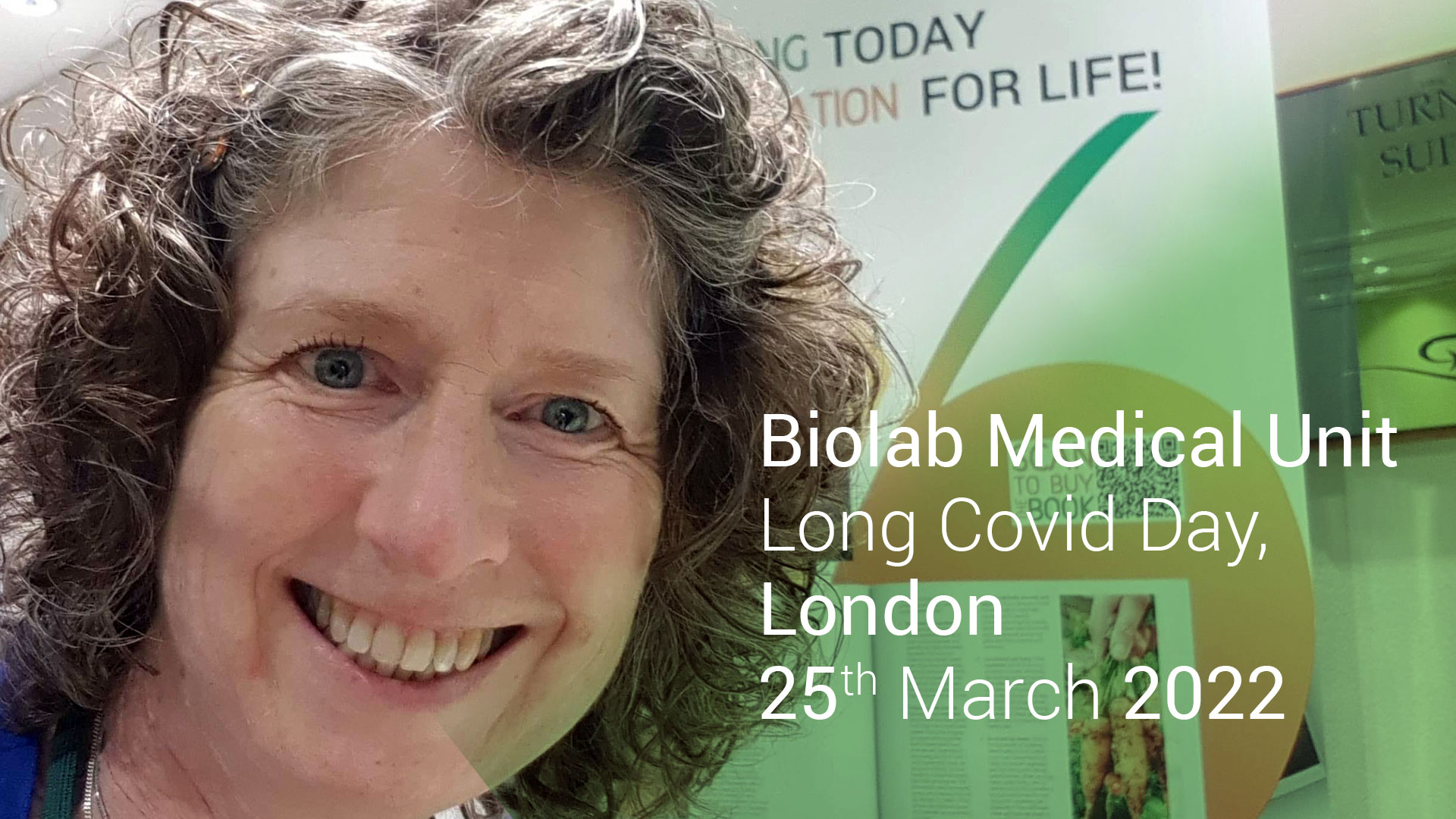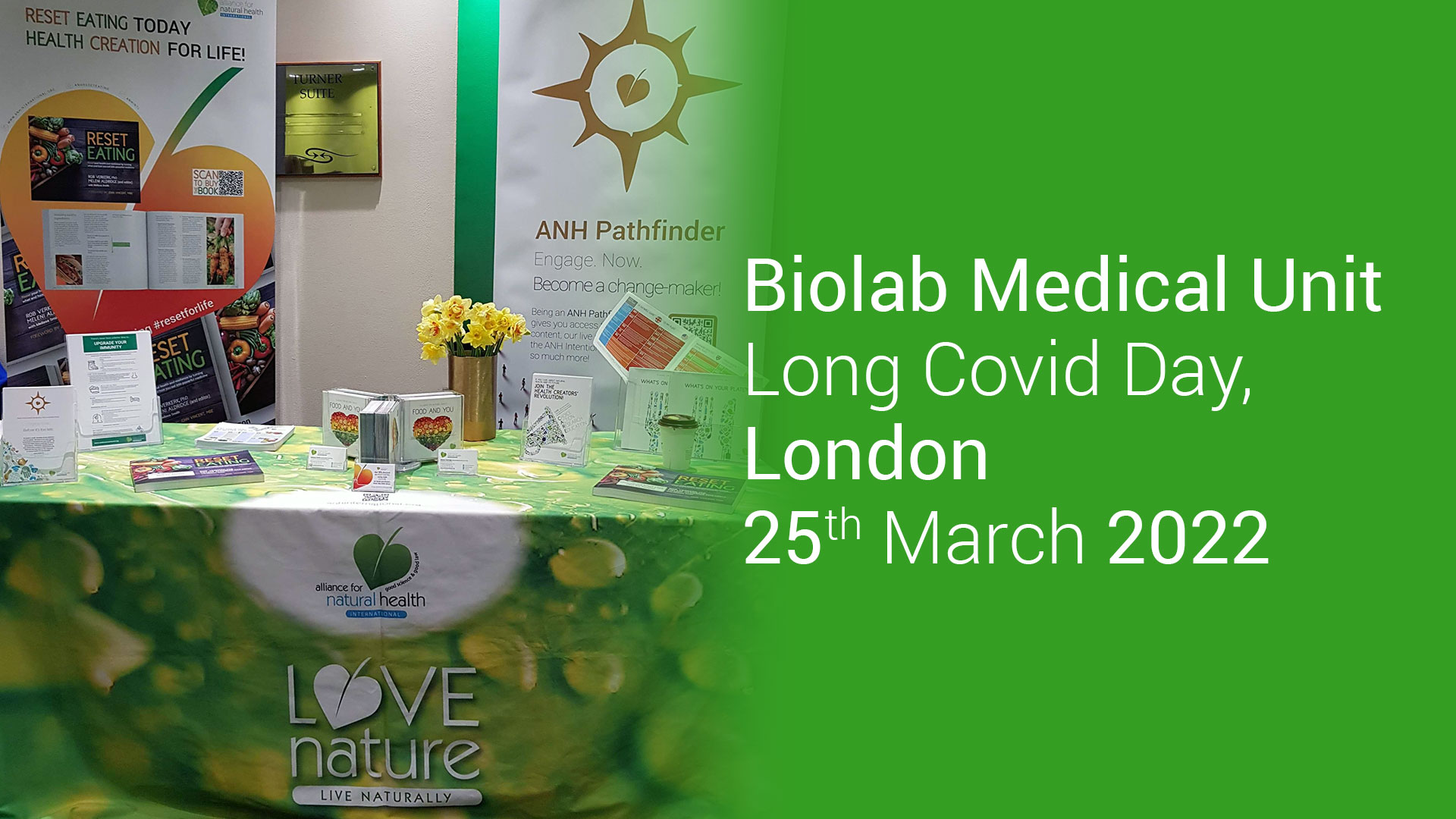Content Sections
By Meleni Aldridge, executive coordinator
Melissa Smith, ANH outreach and development officer, and I attended the Biolab Medical Unit’s (BMU) Long Covid day in London, last Friday. Presented by 7 of BMU's practitioners, the day’s lectures not only defined the many and varied symptoms associated with post-covid malaise, but also a range of clinical pearls from physicians who’ve spent hundreds of clinical hours between them helping patients return to health.
What is long covid?
Known by many names - post-covid syndrome, post-acute sequelae of covid-19 (PASC), chronic covid syndrome (CSS) and long-haul covid. In the US, people living with long covid are often referred to as long-haulers. Rachel Nicoll PhD, medical researcher and organiser of the long covid day, whose research formed the backbone of the day, shared that the term is patient-created and was reportedly first used in May 2020 by Elisa Perego, an archaeologist at University College London. Whatever name you wish to give it, this particular collection (and the list is growing) of post-viral symptoms are unpleasant, debilitating in the extreme and for some, very long lasting.
Unlike other post-viral syndromes, e.g. ME (myalgic encephalomyelitis) or CFS (chronic fatigue syndrome) which have fought a long, hard, battle for conventional medical recognition, long covid is fully accepted and in the UK alone has £18.5 M put aside for 4 research studies and dedicated clinics.
According to Steven Philips MD, citing a paper about PASC, as many as 10% to 30% of people continue to experience debilitating symptoms months after being infected with covid-19. The average age of patients with long covid is around 40, which means that it’s striking down people in their prime working years. This means that we are likely to be feeling the impact to the healthcare system and the economy for years to come.
"The cohort of patients with long Covid will face a difficult and tortuous experience with our multispecialty, organ-focused health care system, in light of the complex and ambiguous clinical presentation and “natural history” of long Covid. There is currently no clearly delineated consensus definition for the condition; indeed, it is easier to describe what it is not than what it is."- Steven Phillips MD, MPH and Michelle Williams ScD, Confronting our Next National Health Disaster - Long-Haul Covid
According to the CDC, long covid is “a range of symptoms that can last weeks or months… [that] can happen to anyone who has had Covid-19”. There is currently no clearly delineated consensus definition of the condition and no accepted objective diagnostic tests or biomarkers. Dr Nicoll reminded us that there is also a lack of uniformity in the long covid studies, coupled with the fact that no one has any idea of the duration.

It was clear through the day’s presentations that long haulers were best served working with experienced health professionals using individualised and whole person medicine. As pointed out by Dr Phillips’ quote above, conventional medicine is too narrow and siloed to address the wide range of interconnected, often clustered, symptoms that people are suffering. Symptoms may be continuous, or relapsing and remitting, making them a challenge to treat and even harder to live with.
>>> Purchase the recordings of the Long Covid Day
Table 1. Long covid symptoms recognised by the NHS, other researchers and conditions reported by the UK Doctors Long covid group.
|
Long covid symptoms recognised by the NHS |
Other referenced symptoms |
Conditions reported by UK Doctors Long covid group |
|
Extreme tiredness (fatigue) |
Post-traumatic stress disorder (PTSD) |
Myocarditis / pericarditis |
|
Shortness of breath (dyspnoea) |
Loss of feeling in the extremities, blue finger nails |
Microvascular angina |
|
Pain or tightness |
Sudden loss of body weight |
Cardiac arrythmias, atrial flutter and atrial fibrillation |
|
Memory and concentration impairment (brain fog) |
Persistent fever with chills, sweats, swollen glands, sneezing, flushing |
Dysautonomia (autonomic dysfunction) including postural orthostatic tachycardia syndrome (POTS) |
|
Difficulty sleeping (insomnia) |
Impaired consciousness, altered mental state, confusion, stroke |
Interstitial lung disease |
|
Heart palpitations |
Skin: papulosquamous eruptions (red to purple, red, scaly patches on the skin), pernio-or chilblain-like lesions |
Thromboembolic disease (pulmonary emboli or cerebral venous thrombosis) |
|
Dizziness |
Impaired balance and gait, tremor |
Myelopathy (spinal cord compression in the neck or thoracic region) |
|
Pins and needles |
Poor glycaemic control, thyroid problems |
Neuropathy (nerve impairment) |
|
Joint / muscle pain |
Bone demineralisation, hair loss |
Neurocognitive disorders |
|
Depression & anxiety |
Visual impairment, ear pain |
Renal impairment |
|
Tinnitus, earaches |
Gut dysbiosis, vomiting |
New onset allergies, anaphylaxis and dysphonia (voice impairment) |
|
Feeling sick, diarrhoea, stomach aches, loss of appetite |
Reduced quality of life |
- |
|
High temperature, cough, headaches, sore throat, changes to sense of smell or taste |
- |
- |
|
Rashes |
- |
- |

Note: Unfortunately, Dr Shideh Pouria was unable to join us on the day.
>>> Purchase the recordings of the Long Covid Day
Top clinical take homes
- Long covid is a diagnosis of exclusion of other causes. In the UK, if sufferers have at least one symptom on the NHS list in Table 1 above, with no other cause, the GP should diagnose them with long covid. Although, diagnosis and treatment are two very different beasts, as described so clearly by Dr Phillips’ quote above.
- Dr Sarah Myhill reminded us that symptoms, of long covid or otherwise, protect us from overspending energy that we don’t have in our body’s energy banks. It’s important not to ‘overspend’ energy that you don’t have when trying to restore health and resilience.
- Unsurprisingly, correct nutrition is essential to provide the raw fuel, and ‘information’ for the plethora of interacting biochemical pathways, needed to reduce inflammation, restore immunological flexibility and return to healthy homeostasis. A low histamine diet was identified as being particularly helpful with mast cell activation syndrome (MCAS).
>>> For more information on turning how and what you eat into powerful medicine check out our new book, RESET EATING
- High dose intravenous vitamin C is powerful enough to supress a cytokine (inflammatory) storm, reduce thrombotic complications and diminish vascular damage.
- Dr Downing related an interesting anecdote from Dr Tom Levy who was successful in returning his own loss of taste and smell using intravenous vitamin C.
- Breath work can be effective in countering the lingering shortness of breath and the resulting fatigue that arises from incorrect breathing. Correct breathing through the nose and down deep into the diaphragm stimulates the vagus nerve on the way, regulating heart rate and the nervous system.
- A range of natural nutrients have been found to be very beneficial - some of which you’ll be familiar given their use for the prevention and treatment of covid-19: Niacin | Ascorbic Acid (vitamin C) | Vitamin D3 | Zinc | Selenium | Quercetin | Curcumin | Magnesium
- Every presentation echoed the need to support gut health. Given that so much of our health and immune function originates here, it’s no wonder that it’s top priority when approaching the treatment of long covid from a whole, person-centred, integrative approach. The guts of sufferers of long covid often appear very disordered.
- Recent studies have found SARS-CoV-2 viral reservoirs in the brain, lung, myocardium, lymphoid tissue (gut, lymph nodes and spleen), as well as the central nervous system, causing some people to become reinfected. In these instances, because the immune system is dysfunctional or distracted, the infection in the viral reservoirs is reactivated.
- Stimulation of the vagal nerve using breathwork can also be very effective at reducing inflammation. Other strategies for vagal nerve stimulation involve eating good quality fats and oils as they create butyric acid to support gut health, gargling and singing. The sonic resonance device, Sensate, combined with an audio track can send infrasonic waves through the chest to reach the vagus nerve and calm your body’s nervous system.
- Finally, a reminder about the givens for good health - good quality sleep; spending time in nature; keeping hydrated with preferably filtered or reverse osmosis-treated water and socialising. Laughter remains extremely good medicine and is free!
>>> Purchase the recordings of the Long Covid Day
"Rachel Nicoll PhD trained as a nutritionist but is now a medical researcher, lecturer and writer. She has worked as an academic in Umea University Sweden, and Helsinki University, Finland, but is now devoting most of her time to writing and lecturing in the UK. She organised and presented at Biolab’s Mitochondria Day, has presented on nutritional and immunological aspects of COVID-19 and has lectured on Environmental Medicine at various schools of nutrition, at events run by supplement companies and at other conferences. She served 5 years on the committee of the British Society for Ecological Medicine (BSEM), where she organised and presented at a number of events."
>>> Alliance for Natural Health International re-Publishing Guidelines
>>> See ANH covid-19 article and video repository at ANH Adapt Don't Fight campaign
>>> For more information on turning how and what you eat into powerful medicine check out our new book, RESET EATING
>>> Find out about healthy eating the ANH-Intl way in our Food4Health campaign









Comments
your voice counts
02 April 2022 at 4:52 pm
Thank you so much for the summary of the long covid day at Biolab. Interesting regarding intravenous vitamin C being a sufficient antidote to a cytokine storm. Has anyone tried the Sensate?
04 April 2022 at 3:03 am
I wonder how much cross-over there is between Long Covid and those suffering the adverse effects of the vaccines?
Like Katie, I'd also be interested to know if anyone in the ANH circle has tried Sensate - and what they thought of it. (I have issues which are possibly connected to the Vagus Nerve - but I can't get a definitive diagnosis for anything - after more than 20years.)
Intravenous Vitamin C is also interesting - but I'm wondering if that alone could correct the sense of taste and smell - I thought that would definitely require Zinc... although (thinking in print) - maybe the IVC destroys any remaining viral pockets - freeing up available zinc to do its other jobs - like support taste and smell!?
Also interesting was that our mainstream (9MSN) news (and typically source of major disinformation on truth - the MSN says it all!) actually had a news segment last night reporting that studies showed that IVC at 150g/24hrs could cure sepsis - which is typically antibiotic resistant!!! (Wonder how long before they will be hauled over the coals for that "mistake"! And maybe they'll even be forced to Air a retraction - similar such things have happened before - where they've been forced to retract a truth!! Or maybe - hopefully the tide is going to turn!) Just so grateful that some of us know the truth! We just have to somehow convince the masses!
Your voice counts
We welcome your comments and are very interested in your point of view, but we ask that you keep them relevant to the article, that they be civil and without commercial links. All comments are moderated prior to being published. We reserve the right to edit or not publish comments that we consider abusive or offensive.
There is extra content here from a third party provider. You will be unable to see this content unless you agree to allow Content Cookies. Cookie Preferences